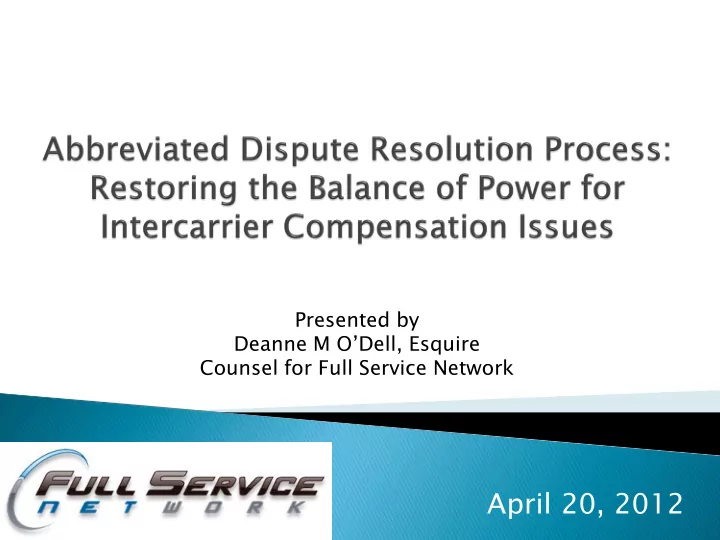

Presented by Deanne M O’Dell, Esquire Counsel for Full Service Network April 20, 2012
Introduction of FSN and Smaller Carriers Traditional Balance of Power Telecom Imbalance of Power Commission Pronouncements ADRP: Restoring the Balance for Smaller Carriers Conclusion 2
FSN - Pennsylvania based small telephone company serving several thousand retail customers Other similarly situated small telephone companies - CLECs, Wireless and RLECs 3
Payment for goods & services required in the marketplace Providers not expected to give away services or products for free Even regulated utilities are permitted to disconnect retail services for non- payment 4
Bottom line result is an equal balance of power Receiver of Provider of Good or Service Good or Service 5
Cannot cease providing wholesale service to other carriers based on a payment dispute Legitimate concern about disrupting the flow of traffic Not a typical arms’ length transaction Carriers cannot demand payment while pursuing their rights 6
Dispute resolution options: ◦ Attempt to privately negotiate a resolution NEED incentive to negotiate OR legal requirement to negotiate ◦ Pursue payment through legal system Extensive time & resource drain 7
Bottom line result is an imbalance of power for telecom carriers with intercarrier compensation disputes Receiver of Good or Service Provider of Good or Service 8
Smaller carriers are more negatively impacted by the imbalance of power Forced to choose between providing services for free or pursuing costly legal options Opportunity cost for carrier filing the complaint e.spire entitled to $60M at time of bankruptcy filing 9
Since 1999 Global Order , Commission concerned with the success of local competition Commission does not condone attempts to escape payment “non-payment of intrastate carrier access charges to Palmerton cannot be condoned as a matter of law and as a matter of sound regulatory policy.” Palmerton v. Global NAPs Commission has asserted jurisdiction to address intercarrier compensation disputes Commission has the authority to establish non-utility rates in a proceeding that was initiated by the filing of a complaint. CCES v. T-Mobile 10
Established in the Global Order Purpose to promote competitive markets by expediting resolution of certain disputes between competing carriers Reviewed twice since 1999 Most recent review occurred in 2005 & current process set forth in Appendix A at Docket No. M-00021685 Proposed rulemaking order still pending 11
Days 31-61 • Exceptions • Good Faith • Commission Negotiation Decision (45 days • ADRP Petition Filed s after exceptions) • Evidentiary Hearing Days 1-30 • Informal Discovery Only Days 62 -120 • ALJ Initial Decision ( 30 days of filing) 12
Pros of Current ADRP Process ◦ Formal ◦ Binding ◦ Expedited ◦ Provides incentive to negotiate Changes Needed to Current ADRP Process ◦ Not well known ◦ Clarify that it is available for intercarrier compensation disputes 13
Mediati ation on ADRP AD RP Litig itigatio ion ◦ Need common ◦ Expedited process ◦ Most time goals to be – less opportunity consuming & successful to delay resolution costly option ◦ Least expensive ◦ Less expensive ◦ Presents many option IF than litigation opportunities to agreement delay resolution ◦ Offers chance for reached carrier to timely ◦ Final decision ◦ No binding resolve dispute & may be too late decision issued get back to for smaller carrier business ◦ Formal & binding 14
15
Deanne M. O'Dell, Esquire Eckert Seamans Cherin & Mellott, LLC 213 Market Street, 8th Floor Harrisburg, PA 17101 (717) 255-3744 dodell@eckertseamans.com 16
Recommend
More recommend